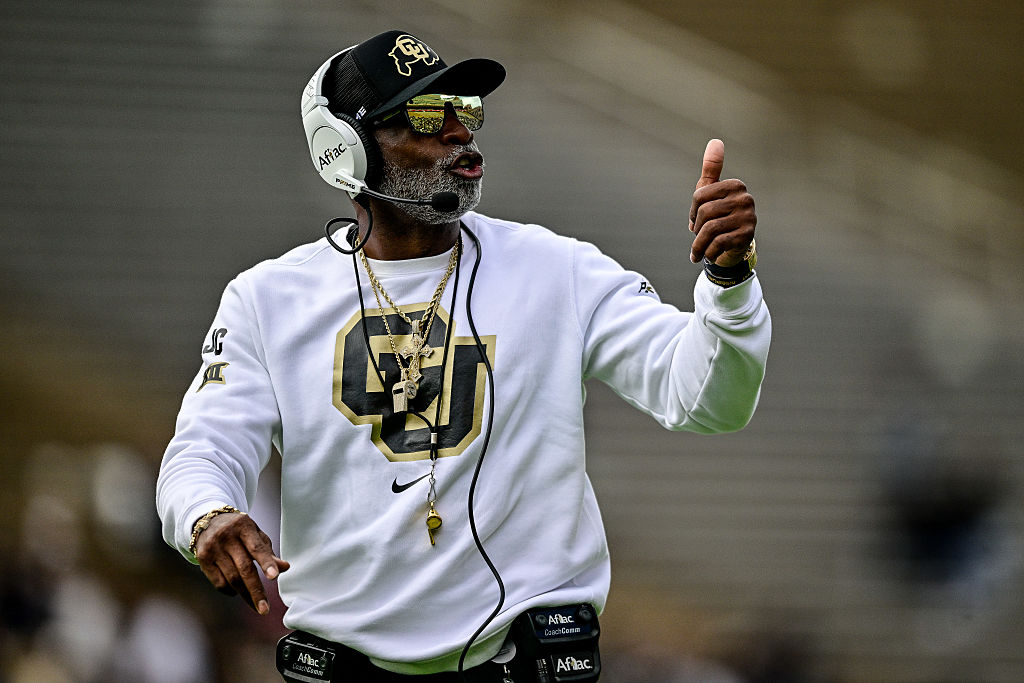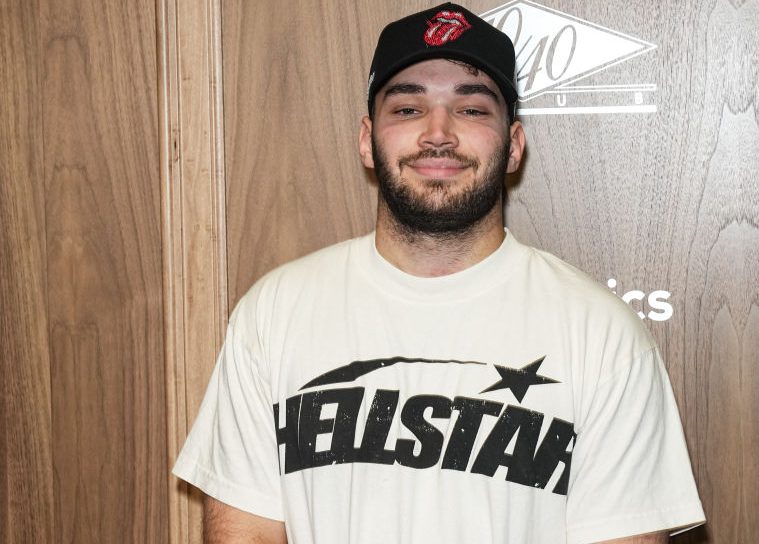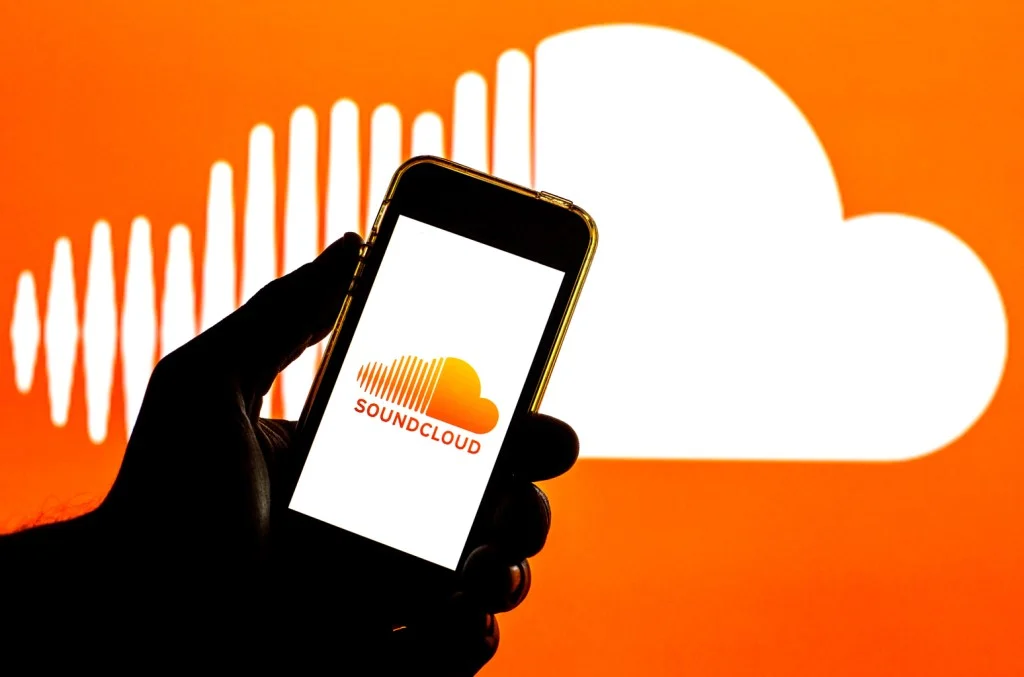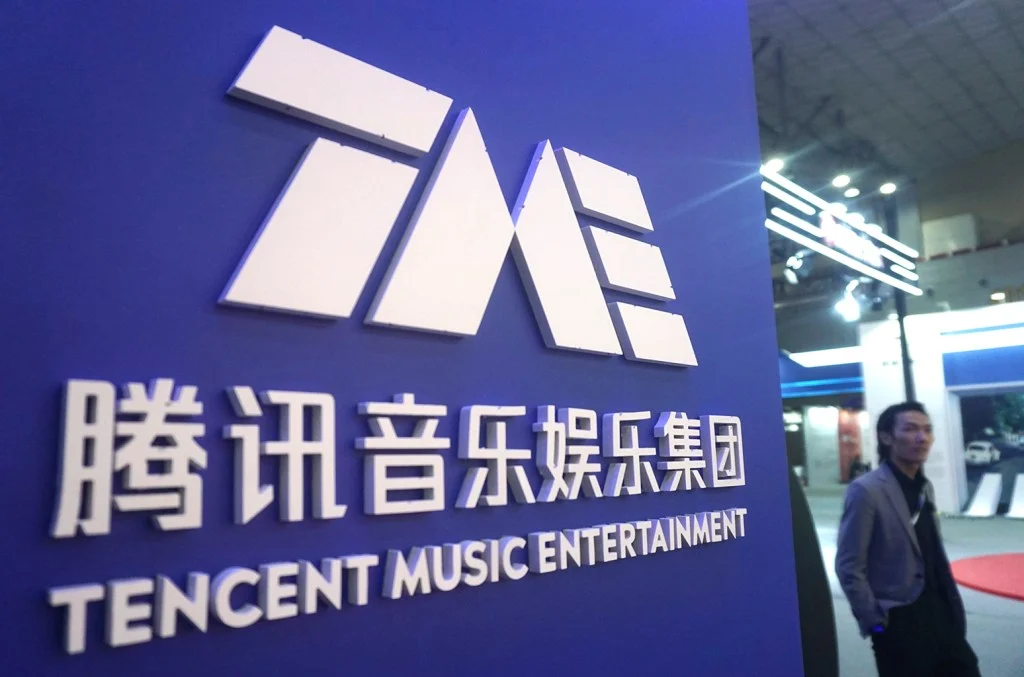Streaming
Page: 8
Source: Dustin Bradford / Getty
Netflix plans on bringing Deion Sanders’ story to life like never before. The streaming platform is working on docuseries about the sports icon.
As reported by Deadline Coach Prime is taking his talents to a new network. This week Netflix announced a new project titled PRIME TIME; a three part docuseries that will detail the career of the multi-sport athlete turned coach. While Sanders’ 1998 autobiography Power, Money and Sex: How Success Almost Ruined My Life gave the world an inside look at his life, this project aims to explore his evolution on a deeper level. According to a press release PRIME TIME “will provide an in-depth look at one of pro sports’ most electrifying and polarizing figures, exploring his evolution from a two-sport pro phenom to a culture-defining coach and media personality.” The network adds that they will also get Deion to open up “about deeply personal aspects of his life, including his relationship with his biological father, surviving an attempted suicide, and near-death health scares.”
Deion Sanders expressed his excitement about the docuseries in a formal statement. “It means so much to finally be able to tell my unfiltered story, my TRUTH. I was PRIME TIME, then I dropped the TIME and went by PRIME, and now I’m in the third quarter of my life and they call me COACH PRIME” he said. “Y’all knew a part of me each step of the way, but you never knew DEION … and I’m excited to share that with you all — the highs and lows, the truths and tragedies, and everything in between. They can’t stop or contain what God has purposed.”
PRIME TIME is currently in production and is slated to premiere in 2026.
HipHopWired Featured Video
Morgan Wallen’s I’m the Problem is off to a blockbuster start. The country superstar’s fourth studio album, released Friday (May 16) through Big Loud/Mercury, is already breaking streaming records on Spotify and Amazon Music. On Friday afternoon, Spotify announced that the 37-track album had set a new benchmark as the most streamed country album in […]
All products and services featured are independently chosen by editors. However, Billboard may receive a commission on orders placed through its retail links, and the retailer may receive certain auditable data for accounting purposes.
Another American Idol finale is almost here. Season 23 premiered on March 2 with hundreds of auditions, and now, just three artists are left. The finale will not only feature performances from the top three singers — Jamal Roberts, Breanna Nix and John Foster — but will also have a wide range of special guests that will take the stage on Sunday including: Jelly Roll, Jessica Simpson, Salt-N-Pepa, Goo Goo Dolls, Josh Groban, Patti LaBelle and more.
Explore
Explore
See latest videos, charts and news
See latest videos, charts and news
In addition, the three Idol judges Luke Bryan, Carrie Underwood and Lionel Richie will perform together. To make sure you don’t miss a moment of this jam-packed finale, we’ve gathered all the information you need to tune in to American Idol this weekend.
Trending on Billboard
When Is the American Idol Season 23 Finale?
The American Idol season finale airs live coast to coast this Sunday, May 18, at 8 p.m. ET/5 p.m. PT. It’s a three-hour event, so that means the winner won’t be announced until around 11 p.m. ET/8 p.m. PT.
Who Are the Top 3 Contestants?
The top 3 artists looking to become the next American Idol are Jamal Roberts, Breanna Nix and John Foster. Who will take home the coveted title?
How to Watch the American Idol Season Finale
The season 23 finale of American Idol airs Sunday at 8 p.m. ET/5 p.m. PT on ABC. Because the show is on network television, you can watch with an indoor HD antenna, and through cable, satellite or a streaming subscription that has ABC.
If you’ve been itching to getting rid of cable, but don’t want to end up spending hundreds of dollars a month, there are a few ways to watch American Idol online without needing cable.
We like DirecTV, which offers access to 90+ channels, including ABC, NBC, CBS, Fox, ESPN, HGTV, MTV, AMC, A&E, TLC, ID, OWN, CNN, Univision and more, plus thousands of movies and shows on-demand. The subscription is free trial for five days, so you can stream American Idol and other shows for free for a limited time.
You can also watch American Idol online through a streaming service like Fubo and SlingTV, which both offer a live feed of ABC as part of its channel lineup. Fubo has a seven-day free trial that you can use to livestream American Idol online free.
How to Watch American Idol on Hulu
Those who miss Sunday’s episodes can stream it on Hulu the next day. Not subscribed? Hulu’s most popular plan is currently $9.99 per month after a free trial. Hulu also offers ad-free streaming for $18.99 per month, plus student discounts and bundle deals with Disney+ and ESPN+.
The best deal right now is this Disney+ and Hulu bundle, which is discounted to just $2.99/month for your first four months. See more details here.
Looking for live channels? Hulu + Live TV gets you 90+ channels, along with access to Hulu, Disney+ and ESPN+ for less than $90 a month. You can watch American Idol on Hulu with a live ABC feed.
Stream network TV shows, cable, sports and more with Hulu + Live TV, in addition to tons of movies and Hulu exclusives such as Sho-gun, Thank You, Goodnight: The Bon Jovi Story, The Bear, Black Twitter: A People’s History, Only Murders in the Building, The Handmaid’s Tale, Death & Other Details, The Kardashians and more.
Hulu subscribers can add Starz, Max and other channels to Hulu, create up to six profiles under one account and stream from up to two different screens at the same time.
The winner of American Idol typically receives a cash prize and gets offered a record deal, though the exact details of this year’s prize has yet to be announced. Watch American Idol online with a free trial to Fubo here.
Source: John Nacion / Getty
Adin Ross caught the ire of Doechii fans after he used a moment during one of his livestream events to insult the buzzing artist for reasons that are still largely unclear. As a result, Adin Ross claims he lost two major brand deals after the Doechii jabs, and this comes while also making light of Megan Thee Stallion’s shooting injury recently.
Adin Ross was a guest on DJ Akademiks’ livestream and detailed the loss of the deal. While he doesn’t explain why those deals were removed from his slate, it was clear that the move bothered him.
“I had two deals lined up, same with DDG, lost both of them,” Ross shared. “I’m mad as f*ck, Ak. It’s not even about the money. It’s just [because]I wanted to do it. It was a big ad, it was a big deal. That’s the reality of how the world works.”
On Monday (May 12), Ross went on a rant against Doechiil, referring to the TDE superstar as the “b-word,” calling her unintelligent, and suggesting she is an industry plant. Some fans online associated his disdain for the Florida rapper due to Kendrick Lamar’s past TDE alignment, and an incident with her staff at the Met Gala event that she has since apologized for.
Ross also took a cheap jab at Megan Thee Stallion’s shooting incident involving Tory Lanez, seemingly in defense of the recently injured and incarcerated Canadian artist.
—
Photo
HipHopWired Featured Video
All products and services featured are independently chosen by editors. However, Billboard may receive a commission on orders placed through its retail links, and the retailer may receive certain auditable data for accounting purposes.
Death may be inevitable but so too are new Final Destination movies, with the horror film franchise spawning a sixth movie, titled Final Destination Bloodlines, in theaters now.
Explore
Explore
See latest videos, charts and news
See latest videos, charts and news
Bloodlines, a.k.a. Final Destination 6, arrives 25 years since the first film in the franchise was released in 2000. Though it debuted at number three at the box office, Final Destination became a word-of-mouth hit, and eventually earned more than $100 million, against its $23 million budget. Five subsequent films followed, each following characters who attempt to cheat death, only to — not-really a spoiler alert — meet their impending doom through a series of freak accidents, natural disasters, human interactions or combination of the above (seriously, I still can’t drive behind a truck full of logs).
Want to watch the Final Destination movies? Here’s what to know about each film, how to watch it in order and where to find them streaming online.
5-FILM COLLECTION
Final Destination 5-Film Collection [Blu-ray]
$12.99
$24.98
48% off
The easiest way to watch all the Final Destination movies is by picking it up on Blu-ray to watch at home. Amazon has this five-film collection on sale for just $12 right now — a 48% discount. You get Final Destination, Final Destination 2, Final Destination 3, The Final Destination and Final Destination 5, plus bonus behind-the-scenes features from each film.
How to Watch Final Destination Movies Online
Want to watch Final Destination online? All of the horror films are streaming on HBO Max (formerly Max). HBO Max subscribers can watch Final Destination on-demand online and stream the movies on their phone, tablet, computer or smart TV (via the Max app). Don’t have an HBO Max subscription?
Plans start at just $9.99/month for access to all the Final Destination movies plus thousands of other TV shows, movies, documentaries and specials.
Your best bet is to grab a current bundle deal, which gets you access to HBO Max plus Disney+ and Hulu all for just $16.99/month. That’s a savings of 43% off.
Can You Watch Final Destination Movies on Amazon Prime Video?
Yes, you can also rent or download all the Final Destination movies on Amazon through Prime Video. Downloaded films get you a digital copy that is yours to keep, so you can watch it on-demand whenever you want. Rentals are good for 30 days; you have 48 hours to finish the film once you start it.
Here’s a list of all the Final Destination films in order as well as options to rent or buy the movies online.
Final Destination (2000)
$7.99
$12.99
38% off
$3.79
“Death hunts down a group of teens one by one.”
Final Destination 2
$6.99
$7.99
13% off
$3.79
$3.99
5% off
“Death stalks a young woman and the group of strangers she saved from a deadly pile-up on the highway.”
Final Destination 3
$6.99
$3.99
“Death makes a bloody date with a group of unlucky teens who escaped a fatal roller-coaster crash in this harrowing horror sequel.”
The Final Destination
$6.99
$9.99
30% off
$3.79
$3.99
5% off
“Death returns to claim the survivors of a massive speedway tragedy in this fourth frightening installment in the Final Destination series.”
Final Destination 5 (2011)
$6.99
$7.99
13% off
$4.29
“Death returns to claim the lucky survivors of a deadly bridge collapse in this fifth frightening installment in the series.”
How to Watch Final Destination Movies Online Free
There are a few ways to stream the Final Destination movies online for free. One way is to watch the films as they air live on TV (HBO is re-running the films all month along, for example). You can use a live TV streaming service like DirecTV, which includes a live HBO feed as part of select plans. Get a free trial to DirecTV here to watch Final Destination online without cable.
You can also find a deal to get HBO Max for free, like this Cricket Wireless plan, which includes a Max subscription for no additional charge. Cricket Wireless customers can log into their account to claim the free HBO Max deal and start streaming Final Destination movies online free.
It’s worth noting that Hulu has a 30-day free trial that you can grab here, but the Final Destination films are only available on the Max on Hulu plan, which requires a $9.99 add-on fee.
SoundCloud CEO Eliah Seton has today (May 14) published an open letter clarifying the company’s position on AI.
This letters follows backlash that happened last week after AI music expert and founder of Fairly Trained, Ed Newton-Rex, posted about SoundCloud’s terms of service quietly changing in February 2024 to allow the platform the ability to “inform, train, develop or serve as input” to AI models.
In his letter, Seton repeats what SoundCloud shared in a statement last week, noting that the platform “has never used artist content to train AI models. Not for music creation. Not for large language models. Not for anything that tries to mimic or replace your work. Period. We don’t build generative AI tools, and we don’t allow third parties to scrape or use artist content from SoundCloud to train them either.”
The letter then goes on to directly address the 2024 Terms of Services changes, which were done, Seton writes, “to clarify how we may use AI internally to improve the platform for both artists and fans. This includes powering smarter recommendations, search, playlisting, content tagging and tools that help prevent fraud.”
Trending on Billboard
But he acknowledges that “the language in the Terms of Use was too broad and wasn’t clear enough. It created confusion, and that’s on us. That’s why we’re fixing it.” He write that the company is revising the Terms of Use to make it “absolutely clear” that “SoundCloud will not use your content to train generative AI models that aim to replicate or synthesize your voice, music, or likeness.” He notes that the Terms of Service updates will be reflected online in the coming weeks.
Seton adds that given the rapidly changing landscape, “If there is an opportunity to use generative AI for the benefit of our human artists, we may make this opportunity available to our human artists with their explicit consent, via an opt-in mechanism. We don’t know what we don’t know, and we have a responsibility to give our human artists the opportunities, choices and control to advance their creative journeys.”
Finally, he notes that the platform is “making a formal commitment that any use of AI on SoundCloud will be based on consent, transparency and artist control.”
Read his complete letter here.
Universal Music Group (UMG) announced a new project with Apple Music on Tuesday (May 13) “to help listeners attain clearer focus, deeper relaxation, and better sleep,” according to a press release. The initiative, called Sound Therapy, takes songs listeners are already familiar with — including tracks from Imagine Dragons, Katy Perry, Kacey Musgraves, Jhené Aiko, […]
Tencent Music Entertainment (TME) said on Tuesday a 17%-surge in music subscription revenue drove higher first quarter revenue for China’s fast-growing streaming platform.
Total revenues rose 8.7% to RMB7.36 billion (US$1.01 billion), with music subscription revenue up 16.6% to RMB4.22 billion (US$581 million) for the quarter ending March 31, 2025, compared to the same time period a year ago. TME’s total subscriber base now stands at 122.9 million, up 8.3% from a year ago. While that is still less than half of Spotify’s total number of paying subscribers — Spotify reported 268 million subscribers in the first quarter — it drove monthly average revenue per paying user (ARPPU) up to RMB11.4 ($1.57) from RMB10.6 ($1.47) a year ago.
“With the sound foundations we have built, a thriving music ecosystem, and healthy financial position, we are well equipped to navigate global uncertainties,” TME’s executive chairman Cussion Pang said in a statement. “We remain on track … to achieve sustainable growth in 2025.”
Trending on Billboard
The Chinese music streaming company operates three music streaming services — Kugou Music, QQ Music and Kuwo Music — as well as WeSing, a karaoke app. In recent years, Tencent Music’s business has become dominated by music services, while its social entertainment business has declined.
Online music revenue increased by nearly 16% to RMB5.80 billion (US$800 million) from a year ago, driven by the rise in music subscription revenues and an increase in advertising revenue. The business also benefitted from higher merchendise revenue from physical album sales for artists like Teens in Times and Silence Wang, and offline performance revenue.
Chinese genres are still the most popular music streamed on its platform, TME executives said, but the growing popularity of Korean, English and Japanese tracks on Tencent Music drove the company to expand existing partnerships with South Korea’s Starship Entertainment and YG Entertainment and Japan’s ACG entertainment company during the quarter.
The company also disclosed it signed a new multi-year licensing agreement with Sony Music Entertainment and extended agreements with Emperor Entertainment Group and Rock Records during the quarter.
TME’s social entertainment business, which has been in decline in part due to government crackdowns on social platforms, fell by nearly 12% to RMB1.55 billion (US$214 million). TME said the decline was “mainly the result of adjustments to certain live-streaming interactive functions and more stringent compliance procedures implemented.”
The strength in subscription revenues drove TME’s gross margin to 44.1% from 40.9%, with a total operating profit of RMB4.84 billion (US$666 million) in the first quarter of 2025, a whopping 146.9% increase from a year ago. Net profit attributable to equity holders was RMB4.29 billion (US$591 million), representing 201.8% year-over-year growth.
The company also said it received 2% equity stake in Universal Music Group in March as a result of a “distribution-in-kind from one of our associates” worth RMB2.37 billion (US$327 million).
Pershing Square Holdings, the hedge fund run by UMG board member Bill Ackman, sold 50 million shares of its UMG holdings — approximately 2.7% of UMG’s outstanding stock — in mid-March as part of a campaign to get UMG to list in the United States.
On Friday (May 9), SoundCloud encountered user backlash after AI music expert and founder of Fairly Trained, Ed Newton-Rex, posted on X that SoundCloud’s terms of service quietly changed in February 2024 to allow the platform the ability to “inform, train, develop or serve as input” to AI models. Over the weekend, SoundCloud clarified via a statement, originally sent to The Verge and also obtained by Billboard, that reads in part: “SoundCloud has never used artist content to train AI models, nor do we develop AI tools or allow third parties to scrape or use SoundCloud content from our platform for AI training purposes.”
The streaming service adds that this change was made last year “to clarify how content may interact with AI technologies within SoundCloud’s own platform,” including AI-powered personalized recommendation tools, streaming fraud detection, and more, and it apparently did not mean that SoundCloud was allowing external AI companies to train on its users’ songs.
Trending on Billboard
SoundCloud seems to claim the right to train on people’s uploaded music in their terms. I think they have major questions to answer over this.I checked the wayback machine – it seems to have been added to their terms on 12th Feb 2024. I’m a SoundCloud user and I can’t see any… pic.twitter.com/NIk7TP7K3C— Ed Newton-Rex (@ednewtonrex) May 9, 2025
Over the years, SoundCloud has announced various partnerships with AI companies, including its acquisition of Singapore-based AI music curation company Musiio in 2022. SoundCloud’s statement added, “Tools like Musiio are strictly used to power artist discovery and content organization, not to train generative AI models.” SoundCloud also has integrations in place with AI firms like Tuney, Voice-Swap, Fadr, Soundful, Tuttii, AIBeatz, TwoShot, Starmony and ACE Studio, and it has teamed up with content identification companies Pex and Audible Magic to ensure these integrations provide rights holders with proper credit and compensation.
The company doesn’t totally rule out the possibility that users’ works will be used for AI training in the future, but says “no such use has taken place to date,” adding that “SoundCloud will introduce robust internal permissioning controls to govern any potential future use. Should we ever consider using user content to train generative AI models, we would introduce clear opt-out mechanisms in advance—at a minimum—and remain committed to transparency with our creator community.”
Read the full statement from SoundCloud below.
“SoundCloud has always been and will remain artist-first. Our focus is on empowering artists with control, clarity, and meaningful opportunities to grow. We believe AI, when developed responsibly, can expand creative potential—especially when guided by principles of consent, attribution, and fair compensation.
SoundCloud has never used artist content to train AI models, nor do we develop AI tools or allow third parties to scrape or use SoundCloud content from our platform for AI training purposes. In fact, we implemented technical safeguards, including a “no AI” tag on our site to explicitly prohibit unauthorized use.
The February 2024 update to our Terms of Service was intended to clarify how content may interact with AI technologies within SoundCloud’s own platform. Use cases include personalized recommendations, content organization, fraud detection, and improvements to content identification with the help of AI Technologies.
Any future application of AI at SoundCloud will be designed to support human artists, enhancing the tools, capabilities, reach and opportunities available to them on our platform. Examples include improving music recommendations, generating playlists, organizing content, and detecting fraudulent activity. These efforts are aligned with existing licensing agreements and ethical standards. Tools like Musiio are strictly used to power artist discovery and content organization, not to train generative AI models.
We understand the concerns raised and remain committed to open dialogue. Artists will continue to have control over their work, and we’ll keep our community informed every step of the way as we explore innovation and apply AI technologies responsibly, especially as legal and commercial frameworks continue to evolve.”
Apple approved Spotify’s app update in the U.S. on Friday (May 2), marking “a significant milestone for developers and entrepreneurs everywhere who want to build and compete on a more level playing field,” according to the streamer.
The announcement followed the news that a judge told Apple to stop collecting a commission on some app sales. “After nearly a decade, this will finally allow us to freely show clear pricing information and links to purchase, fostering transparency and choice for U.S. consumers,” Spotify wrote in a blog post. “We can now give consumers lower prices, more control, and easier access to the Spotify experience.”
Epic Games, the company behind the wildly popular game Fortnite, sued Apple over its App Store policies — which ensured that Apple took a 30% cut of any payments — in 2020.
Trending on Billboard
Epic Games was not the only company that disliked this arrangement: Horacio Gutierrez, Spotify’s chief legal officer, said in 2020 that Apple “acts as the stadium owner, referee and player, and tilts the playing field in favor of its own services.”
The following year, Yvonne Gonzalez Rogers, a judge in the U.S. District Court for the Northern District of California, ruled that Apple had violated the state’s laws prohibiting unfair competition.
Despite that ruling, the same judge said this week that Apple put a new system in place that required apps with external sales to pay a 27% commission. The company “sought to maintain a revenue stream worth billions in direct defiance of this court’s injunction,” the judge wrote.
The judge demanded that Apple stop collecting that commission. “We strongly disagree with the decision,” an Apple spokeswoman told The New York Times. “We will comply with the court’s order, and we will appeal.”
Spotify hailed the development as “a great day” for its U.S. users. “The ruling made it clear that Apple deliberately abused its market power to intentionally harm others and benefit only itself,” the company wrote.
Moving forward, Spotify said U.S. users will now have visibility into “pricing details on subscriptions and information about promotions that will save money,” have the option to pay for subscriptions outside of Apple’s system, and have the ability to easily upgrade from their account or change their subscription plan.
“The fact that we haven’t been able to deliver these basic services, which were permitted by the judge’s order four years ago, is absurd,” Spotify added.

 State Champ Radio
State Champ Radio 









